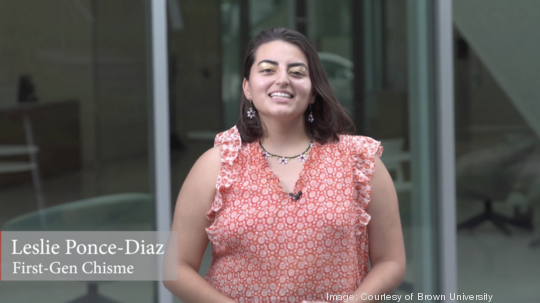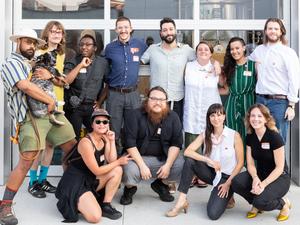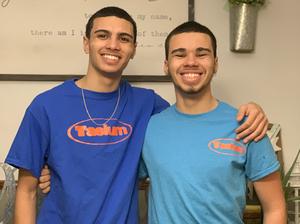
Last week, we introduced the first seven ventures from the Breakthrough Lab (B-Lab), an accelerator hosted by Brown University’s Jonathan M. Nelson Center for Entrepreneurship. The program is in its seventh year and churned out another batch of 15 impressive startups. As a refresher, B-Lab is an eight-week program for students from either Brown University or the Rhode Island School of Design. It provides mentoring and workshops, co-working space at the Nelson center, and a scholarly award of $4,000 for currently enrolled students. Without further ado, let’s meet the eight remaining startups in the cohort.
First-Generation Chisme
When Leslie Ponce-Díaz, a first-generation student, first started college at the Rhode Island School of Design, she felt lost, unsupported, and a lot of times was close to dropping out. But as she got acclimated, she realized she was not alone and that there were many first-generation, BIPOC students in a similar position. So Ponce-Díaz launched First-Generation Chisme, a nonprofit that provides post-secondary education resources for these students. The nonprofit does this through printed assets, ad and mobile tech solutions, and community events. Ponce-Díaz and her team make content including podcasts and print and digital content. Then they try to connect first-generation students with others that have been through similar experiences. Recently, First-Generation Chisme donated school supplies to high school students in the Kansas City area and helped vaccinate 150 people in the area as well. Ponce-Díaz is looking to plan an after-school mentorship program, continue building out the nonprofit’s team, and is looking for other accelerators that are more targeted to first-generation nonprofits.
Flowbits
College students are peppered with information like recruiting emails, social events, class updates, club outreach, or campus events. The information is usually sent across different platforms and media and can be easily missed, out of date, or lost. To solve this problem, a trio that includes Yenteen Hu, Matt Reed, and Roman Hall has launched Flowbits, a marketplace for students to manage tasks and events. Using Flowbits' software, students can select syllabus information and integrate it into their own organizational system in just seconds. Everything is kept up to date and users are notified when things change. Professors, teaching assistants and anyone else can use Flowbits as a centralized way to reflect scheduling changes. While the platform is launching for students, the founding team believes the software could benefit many other industries including fitness, chore tracking, convention scheduling, and event programming. Flowbits is currently preparing for beta testing and would like to formally launch in the Fall of 2022.
Jula
When Jula first launched, the company initially sought to help small businesses in Gambia and all of West Africa expand their customer base through an e-commerce platform. But Jula founders Isatou Saho and Saron Fisseha soon realized that expanding their customer base digitally would not be enough to help small businesses in this region scale. The key, Saho and her team discovered, is for these businesses to better understand their own markets. With this in mind, Jula pivoted to a business intelligence and market research platform that will help businesses of all sizes innovate and design products by leveraging data. This also translates to helping consumers in West Africa, many of whom make less than $1,500 per month, take advantage of their purchasing power.
Keeb World
Beyond the typical keyboards at our desks and in work offices everywhere, there is a much larger world of mechanical keyboards that come in every shape, color and size, which are purchased and sold as collectibles. This community has a 1 million-person Reddit group and is expected to be valued at $1.3 billion by 2023. Ryan Burnett, a mechanical keyboard enthusiast, is seeking to erase the pain points that the buyers and sellers of mechanical keyboards face when transacting with one another by developing a new marketplace called Keeb World. The site will attempt to act as the middleman between the buyers and sellers by having an online tool that allows users to search and filter among thousands of keyboard parts, which typically can’t be found on Amazon or Best Buy. Burnett also thinks the site will increase product visibility for vendors. He plans to have educational content and do-it-yourself videos on the site, which he plans to support financially through advertising and affiliated links with certain vendors. Burnett also eventually wants to expand to the enthusiast mouse pad market and hopes to eventually sell his own line of keyboards. Currently, Burnett is looking for a technical co-founder to help him build the marketplace.
Revive
For social-good organizations, attracting young people to volunteer and contribute to their cause has become a real challenge. These organizations need youth to bring energy and cultural knowledge to engage other Gen-Z and millennials, which currently make up the largest tier of donors. But just because these social good organizations are struggling to bring in more youth, it doesn’t mean they don’t want to contribute. While roughly 80% of young people want to help those in need, 42% of youth say they don’t know how. To close the gap, Brown students Zoe Fuad and Carina Sandoval have launched Revive, an organization that finds, recruits, and trains younger people to join organizations. Revive finds and recruits passionate youth looking to make change in their communities, and then trains them in advocacy skills to make them more effective members. These youth go into the organizations with training and direct knowledge about the organization they are volunteering for and the associated issues. Revive will also compensate the youth for their time and can help organizations create a more youthful image. In turn, social good organizations will pay Revive a fee for their services.
Soirée
Close to half of the companies in the S&P 500 Index now have a chief diversity officer, demonstrating how diversity, equity, and inclusion (DEI) have started to become more of a priority in the corporate world. But there is still a long way to go. Soirée is hoping to advance these efforts with its platform that serves as an online professional network and recruiting pipeline for Black and Latinx college students. Founded by Brown students Sterling Stiger and Michael Mireles, Soirée has two sides to the platform. One is the Black and Latinx college students looking to form real and goal-oriented connections and the other is companies recruiting these students as employees. Companies that join Soiree are evaluated across various categories of corporate social responsibility and DEI principles to ensure they are committed to values such as DEI. Then companies can set up groups on Soirée that students can join and where they can set up networking events and workshops. Companies pay an annual subscription fee to join the platform, and initial revenue also comes from commissions, job postings, third-party service providers, and advertisers.
The Reem Co.
Insurance in the U.S. is a $3 trillion industry with over 5,900 companies. But Brown student Whitney Terrill thinks the available options in the U.S. do not adequately meet the needs of the 3.5 million people in the U.S. Muslim community. Her solution is The Reem Co., a Shari'a–compliant insurance brokerage that offers personal and commercial lines of insurance. According to Terrill, there are no insurance companies that comply with the principles of Islamic finance, which encompasses justice, fairness, discouraging speculation, transparency and financial products acceptable for all Muslims and non-Muslims. Reem plans to not only provide personal and commercial lines of insurance but also interest-free products, collective risk-sharing, avoidance of speculation and gambling, and limitations on uncertainty in contracts.
Workista
There are roughly 5.7 million businesses in the U.S. across all industries leveraging data in some capacity to help them manage their operations. Data consumption is also growing by 19.2% annually. As a result, companies all over need data scientists and often end up outsourcing the work to fill this role. Unfortunately, sites like LinkedIn take too long to filter through and outside agencies and job boards can take hefty commissions. That’s why Andrew Kim, who’s majoring in applied mathematics and computer science at Brown, is attempting to launch Workista, a marketplace for hiring and finding freelance data scientists. Unlike competitors, Workista doesn’t take commissions but charges a $200 fee per job post. Kim was also planning to launch a subscription option for repeat employers who hire on the site, and Workista will use an AI algorithm to find better matches for companies. Since the end of B-Lab, Workista is looking to pivot into other problems, spaces, and business models.








